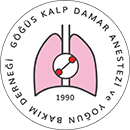

Comparing Two Models of Pediatric Cardiac Care Establishment in a Developing Country
Mehmet Biçer1, Şima Kozan2, Figen Öztürk3, Murat Tanyıldız4, Ömer Özden4, Mete Han Kızılkaya5, Atıf Akçevin1, Ender Ödemiş51Department of Pediatric Cardiovascular Surgery, Koç University Hospital, İstanbul, Türkiye2Koç University Faculty of Medicine, İstanbul, Türkiye
3Department of Anesthesiology and Reanimation, Clinic of Evangelisches, Gelsenkirchen, Germany
4Department of Pediatric Intensive Care, Koç University Hospital, İstanbul, Türkiye
5Department of Pediatric Cardiology, Koç University Hospital, İstanbul, Türkiye
Objectives: Multidisciplinary cardiac care is well known to lead to improved outcomes. In this study, two different organizational models (surgeonled and team-based units) for pediatric cardiac intensive care unit (ICU) located in a developing country setting and their early postoperative out-comes for patients with pediatric congenital heart disease were compared.
Methods: A total of 246 infants and children who underwent surgery for congenital cardiac diseases were retrospectively analyzed. The correlations between the perioperative patient data of both models were analyzed and compared. The predictive factors for morbidity were calculated. Results: No significant difference was observed in the Society of Thoracic SurgeonsEuropean Association for Cardio-Thoracic Surgery (STS-EACTS) mortality category and estimated mortality rate between groups. However, a statistically significant difference was observed in the STS-EACTS estimated postoperative length of stay and estimated major complication rate between groups. The extubation time and length of ICU stay varied significantly between groups.
Conclusion: Compared with the surgeon-led model, the team-based model resulted in superior postoperative patient outcomes in terms of morbidity, shorter extubation time, and ICU length of stay. Thus, in developing countries, higher morbidity rather than mortality may be anticipated when undertaking congenital heart surgery in non-neonatal age groups without a multidisciplinary team to support the surgeon. Therefore, higher major complications can be expected when congenital heart surgery programs have to be established despite the lack of experienced staffing.
Makale Dili: İngilizce
(540 kere indirildi)

















